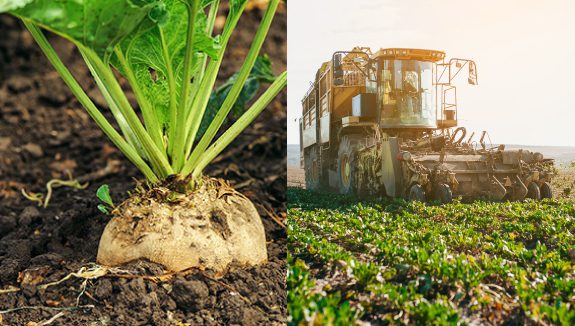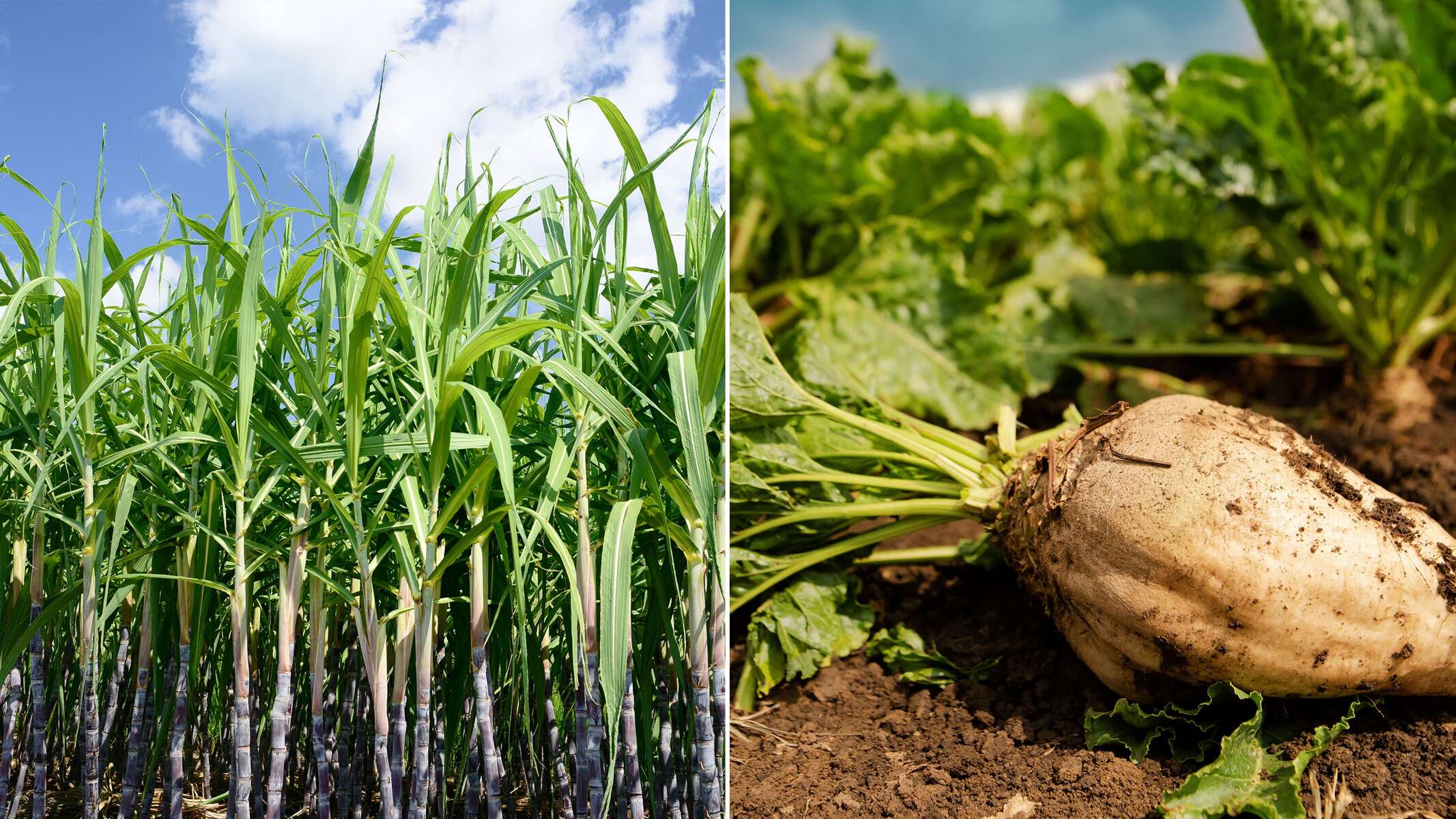Understanding the chemistry behind Sugar beet vs sugar cane production
The Great Dispute: Sugar Beet Vs Sugar Cane - Which Is the Superior Option for Sweeteners?
The argument over sugar beet versus sugar cane as the preferred sweetener entails numerous critical factors. Each deals distinctive benefits and obstacles pertaining to manufacturing, flavor, and health and wellness implications. While sugar beet might appeal to those focusing on sustainability, sugar cane has its very own cultural and cooking value. As customers end up being much more conscious of their selections, the inquiry stays: which sweetener absolutely stands out in today's market?
The Beginnings of Sugar Beet and Sugar Cane
Although sugar cane has actually been cultivated for thousands of years, largely in tropical regions, sugar beet arised as a significant choice in cooler climates throughout the 18th century. Sugar cane, indigenous to Southeast Asia, was very first tamed around 8000 BCE and spread out internationally with trade and exploration. Its high sucrose web content made it a valuable plant, resulting in comprehensive vineyards in regions like the Caribbean and Brazil.
On the other hand, sugar beet was first grown in the Mediterranean around the 18th century, especially acquiring traction in Europe as a feedback to sugar cane lacks. The plant thrives in warm environments, making it ideal for regions with cooler weather. The exploration that sugar could be drawn out from beet origins reinvented sugar production, especially throughout the Napoleonic Wars when trade constraints minimal cane sugar accessibility. The surge of sugar beet growing marked a turning point in the history of sugar, supplying a regional source for lots of countries.
Production Processes: From Field to Sugar
The production processes of sugar beet and sugar cane expose substantial distinctions in cultivation strategies, harvesting techniques, and improvement phases. Understanding these subtleties is important for valuing just how each plant contributes to the overall sugar market. This comparison highlights the special qualities and challenges connected with both sources of sweet taste.

Cultivation Methods Contrast
Farming techniques for sugar beet and sugar cane expose unique techniques that affect their manufacturing processes, from field prep work to last sugar removal. Sugar beet farming generally includes raking and harrowing to develop a great seedbed, adhered to by seeding in rows to help with growth. This plant take advantage of cooler climates and is often grown in springtime. On the other hand, sugar cane is typically grown in furrows with pre-sprouted cane items, needing a warm, tropical climate for perfect development. Cane fields are commonly laid out to take care of water successfully, given its requirement for substantial watering. Both crops are handled with certain fertilization and insect control methods tailored to their growth environments, influencing return top quality and performance in sugar extraction.

Gathering Techniques Described
Reliable gathering techniques for sugar beet and sugar cane play a crucial function in ensuring maximum yield and quality of the end product. Sugar beet gathering normally utilizes mechanized root farmers, which successfully uproot the beets from the dirt and separate them from the foliage. This method minimizes damages to the beets and reduces labor prices. In contrast, sugar cane harvesting may utilize either hand-operated labor or equipment, depending on the area and scale of production. Mechanical farmers cut the cane at the base and frequently strip away the fallen leaves, enhancing the process for larger fields. Both techniques call for careful timing to guarantee the plants are collected at peak sweet taste, influencing the high quality of the final sugar product.
Improvement Process Distinctions
While both sugar beet and sugar cane undertake rigorous refinement procedures to transform their raw forms right into usable sugar, the methods used differ considerably. Sugar beet refinement begins with washing and slicing the beetroots right into slim cossettes, adhered to by diffusion, where warm water extracts sucrose. The resulting juice is then purified, concentrated, and taken shape. In contrast, sugar cane handling entails squashing the stalks to draw out juice, which is after that clarified utilizing lime and heat to eliminate pollutants. The cane juice is evaporated to create syrup prior to condensation. Inevitably, while both procedures aim to create white sugar, the distinctive techniques highlight the distinct characteristics of each source and their effects for flavor and purity in the last item.
Nutritional Profiles: What's in Your Sweetener?
The nutritional accounts of sugar beet and sugar cane present distinct differences worth checking out. This comparison includes aspects such as caloric content, mineral and vitamin presence, and variations in glycemic index. Recognizing these factors can offer insights into how each sweetener might impact total wellness.
Calorie Web Content Contrast
Recognizing the caloric content of sugar beet and sugar cane is vital for those mindful of their dietary choices. Both sweeteners mostly include sucrose, adding a similar caloric worth. Typically, sugar beet has roughly 387 calories per 100 grams, while sugar cane has regarding 390 calories per the same amount. The minor difference in caloric content may not significantly effect most diets; however, it is remarkable for those very closely checking their calorie intake. In addition, both sugar sources supply energy yet Learn More Here lack necessary nutrients, making them largely resources of vacant calories. As a result, people seeking healthier alternatives might desire to take into consideration these aspects when choosing between sugar beet and sugar cane as their liked sugar.

Mineral and Vitamin Material
Calorie content supplies just a part of the photo when assessing sugar beet and sugar cane. Both sources of sugar differ considerably in their mineral and vitamin profiles. Sugar beetroots are remarkably rich in essential nutrients, consisting of potassium, magnesium, This Site and iron. They additionally have percentages of vitamins such as B6 and folate, contributing to their dietary worth. In comparison, sugar cane offers a various collection of benefits, containing calcium, phosphorus, and traces of B vitamins. While neither choice is a significant resource of vitamins and minerals contrasted to entire foods, sugar beets may have a minor edge because of their greater mineral web content. Ultimately, consumers looking for nutritional advantages from sugar should think about these distinctions in accounts.
Glycemic Index Differences
Glycemic index plays an essential function in examining how different sweeteners affect blood glucose degrees. Sugar beet and sugar cane show noteworthy differences in their glycemic reactions. Normally, sugar beet has a reduced glycemic index contrasted to sugar cane, causing a slower and steadier rise in blood sugar degrees after usage. This attribute might make sugar beet a better alternative for individuals managing diabetic issues or those seeking to maintain stable energy degrees. On the other hand, sugar cane tends to cause a more quick spike in blood sugar level, which can lead to quicker power collisions. Recognizing these distinctions is considerable for consumers aiming to make enlightened dietary options relating to sweeteners and their influence on overall health.
Ecological Influence: Sustainability Considerations
While both sugar beet and sugar cane are necessary sources of sugar, their environmental influences and sustainability factors to consider differ substantially. Sugar beetroots, primarily grown in pleasant regions, generally call for much less water and can be grown in diverse environments. They also gain from crop turning practices, which improve soil health and wellness and minimize the requirement for synthetic fertilizers. Nevertheless, intensive farming of sugar beetroots can result in dirt deficiency and chemical use.
In contrast, sugar cane grows in tropical environments and usually requires significant water sources for watering (Sugar beet vs sugar cane). The monoculture nature of sugar cane farming can intensify dirt erosion and biodiversity loss. Furthermore, the burning of cane fields prior to harvest launches carbon exhausts and adds to air contamination. Both crops deal with challenges pertaining to climate change, however their varying growing techniques profoundly influence their total sustainability profiles. Consequently, the choice between sugar beet and sugar cane entails weighing these environmental influences thoroughly
Taste and Culinary Utilizes: Which Sweetener Reigns Supreme?
The option in between sugar beet and sugar cane prolongs past environmental considerations to incorporate preference and cooking applications. Sugar beet, usually perceived as having a somewhat various taste account, tends to be less wonderful than sugar cane. This refined distinction find out this here can influence its use in recipes, especially in baked products where a neutral sweet taste is preferred.
Conversely, sugar cane is celebrated for its unique, abundant, and much more complex flavor, making it a preferred option for drinks and treats - Sugar beet vs sugar cane. Its all-natural molasses content can improve the depth of tastes in various dishes
In food preparation, sugar cane's flexibility radiates through in marinades, glazes, and confections, while sugar beet is generally discovered in processed foods and sweeteners like granulated sugar. Eventually, the decision between both sweeteners frequently depends upon private taste preferences and specific cooking applications, with each offering one-of-a-kind benefits in the kitchen area.
Health Implications: Sugar Beet Vs Sugar Cane
Both sugar beet and sugar cane have distinct wellness implications that can influence consumer choices. Sugar beet vs sugar cane. Sugar beet is typically concerned for its higher fiber web content, which can aid digestion wellness. Additionally, it consists of particular anti-oxidants that might contribute to overall wellness. On the other hand, sugar cane is abundant in nutrients such as calcium, potassium, and magnesium, supplying some mineral benefits
Nevertheless, both resources mostly contain sucrose, which can cause similar health and wellness concerns when taken in excessively, such as excessive weight, diabetes mellitus, and cardiovascular disease. The processing methods likewise differ; sugar beet is generally improved more intensively, possibly causing a loss of specific nutrients. Consumers concerned about ingredients might prefer sugar cane, as it frequently undertakes less handling. Ultimately, comprehending these health ramifications can assist people towards making educated decisions regarding their sugar choices.
Customer Preferences: Patterns and Insights
Consumer choices for sweeteners have progressed significantly over the last few years, affected by wellness fads, environmental issues, and nutritional options. Boosted awareness of the negative wellness effects associated with too much sugar intake has led several customers to look for options. This change has prompted an expanding passion in natural sweeteners, with sugar beet and sugar cane going to the forefront of discussions.
Research study suggests that customers are progressively favoring sugar beet due to its viewed ecological advantages, as it is commonly grown closer to processing plants, minimizing transportation emissions. Conversely, sugar cane is usually connected with exotic regions and might carry assumptions of sustainability difficulties.

Regularly Asked Inquiries
Just How Do Sugar Beet and Sugar Cane Affect Blood Sugar Degrees?
Sugar beet and sugar cane both include sucrose, which can raise blood glucose degrees. The effect mainly depends on private metabolic process and intake quantities, but both sources contribute similarly to blood sugar feedbacks in many cases.
Which Sugar Is Much Better for Cooking and Cooking?
When reviewing sweeteners for cooking and food preparation, one should consider structure, taste, and wetness retention. Sugar beet and sugar cane both supply one-of-a-kind top qualities, with sugar cane frequently chosen for its richer taste account in cooking applications.
Can Sugar Beet or Cane Be Utilized in Vegan Diets?
Both sugar beet and sugar cane can be used in vegan diets. They are plant-derived sweeteners, making them ideal for individuals looking for vegan-friendly choices without animal items, ensuring honest options in their cooking techniques.
What Are the Historic Uses Sugar Beet and Cane?
Historically, sugar beet and cane functioned as essential resources of sweet taste, with cane grown in exotic areas and beet in pleasant zones. Both have been integral to numerous societies, economic situations, and cooking customs throughout history.
Exist Any Alternatives to Sugar Beet and Cane?
Alternatives to sugar beet and cane include agave nectar, honey, maple syrup, and sweetening agents like aspartame and sucralose. These alternatives provide differing flavors and health advantages, attracting diverse dietary choices and restrictions.